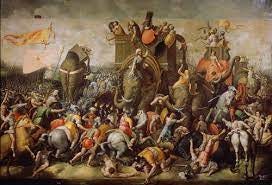If you are looking for the beginning of the study for The Young Carthaginian then you can go HERE for a brief introduction. At the bottom of the introduction you will find the links to each section of the study guide as it becomes available. If you would like to see the growing list of book studies available for free on this site you can go HERE. Enjoy!
Grammar Questions: (The Information of the Text)
What great loss did Malchus suffer from the Battle of the Trebia?
What made Malchus have feelings of hatred for his own country?
What is the “lesson” which Rome will “not be slow to profit by”?
What did Malchus “obtain leave” to do during the winter months?
What alliance does Hannibal wish Malchus to form?
What did Allobrigius say were “drawbacks” to permanent homes?
What “even greater hardships” did the Carthaginians face that were even more trying than the pass through the alps?
How did Hannibal manage to kill or capture the entire army of Flaminius?
On what mission did Hannibal send Malchus at the end of this chapter?
Logic Questions: (Interpreting, Comparing/Contrasting, Reasoning)
Malchus said, “I suppose that neither there nor anywhere else have girls respect for their brothers.” Translate this statement into standard categorical form and use it as part of a valid syllogism.
Why is Malchus attracted to the lifestyle of the Gauls as opposed to that of the Carthaginians?
What do you think is probably the real reason Servilius did not come to aid Flaminius when he asked for his help?
Why does Hannibal think it “would be ruin” for him to attack Rome directly at present?
Why did Trebon say that the “prudent man would decide for Rome” gaining the victory in the end?
Rhetoric Questions: (The Analysis of Ideas in the Text)
Malchus said, “Giscon was right….All means are justifiable to rid one’s country of those who are destroying her.” Do you agree or disagree with this sentiment? Explain why you think as you do. What objection might someone make against your position?
Theological Analysis: (Sola Scriptura)
Read Matthew 26:47-56. How should Jesus’ teaching, after a man’s ear is struck off, impact our thinking concerning the rhetoric question above?



